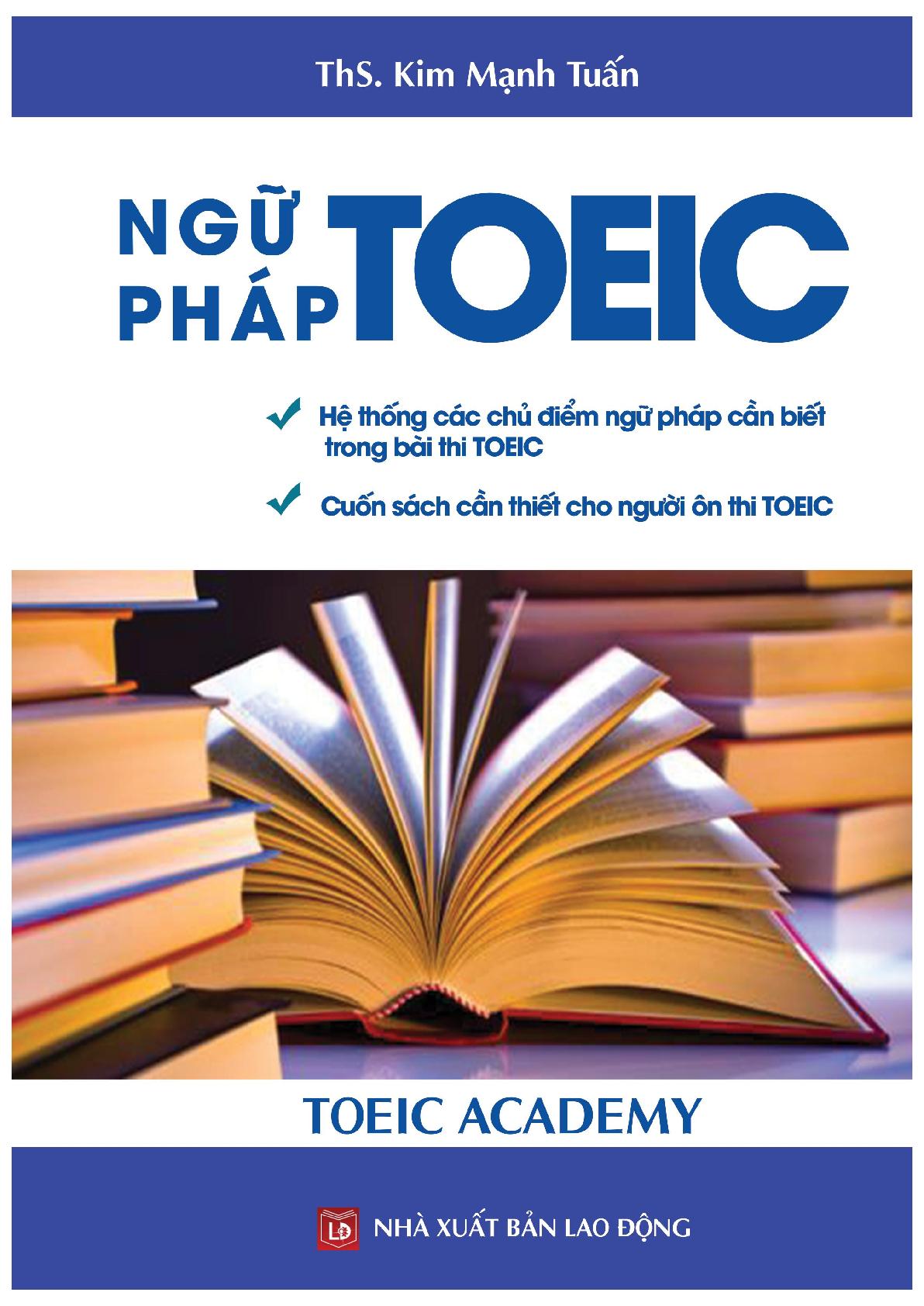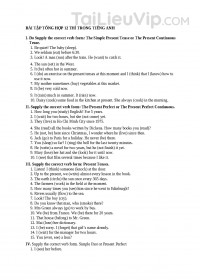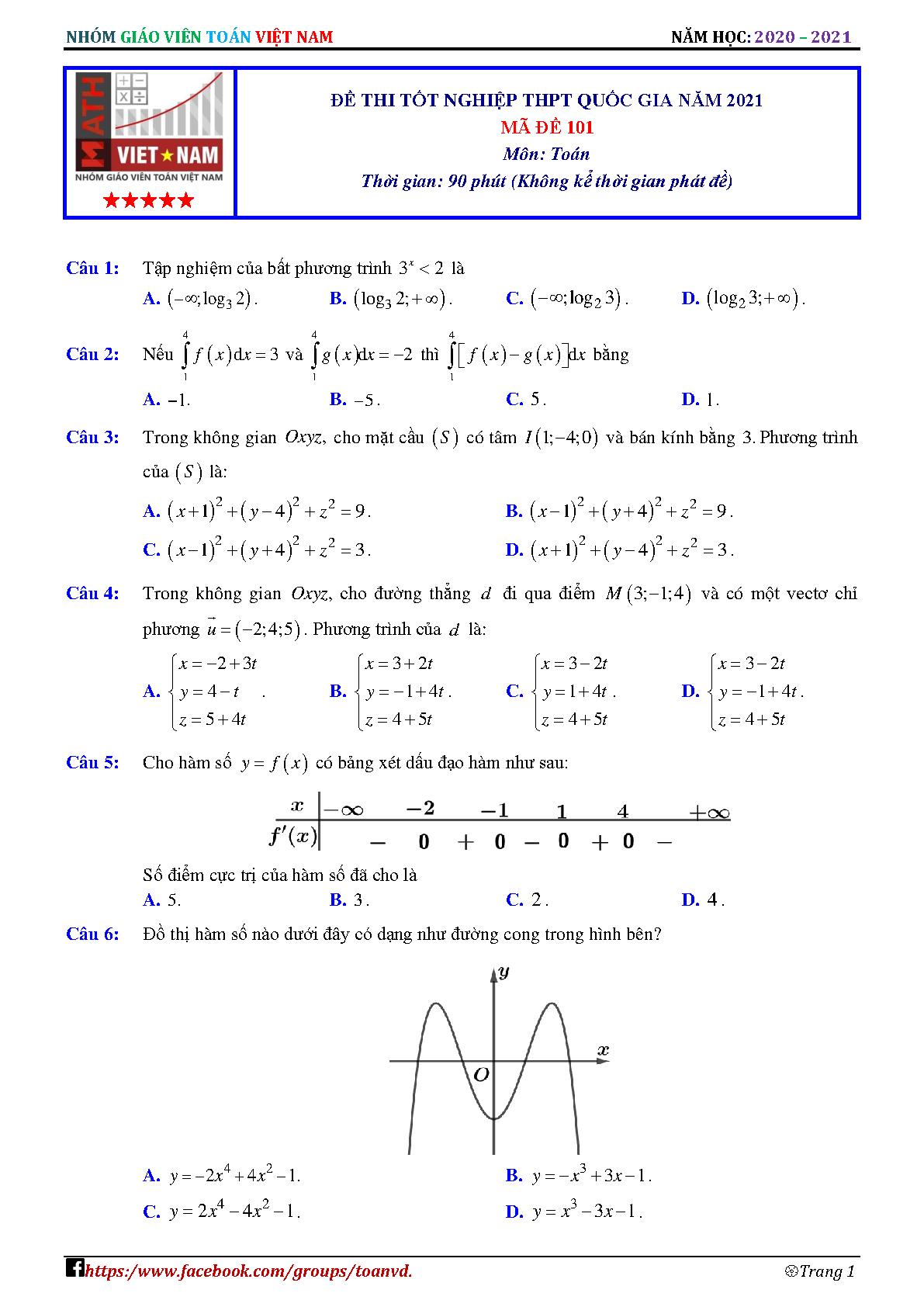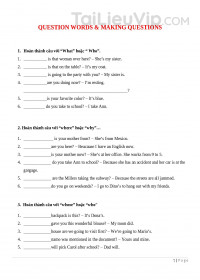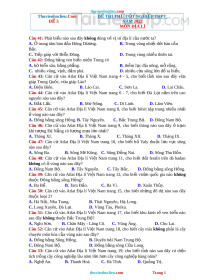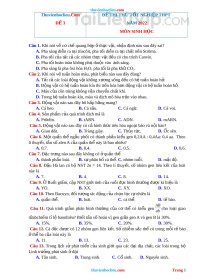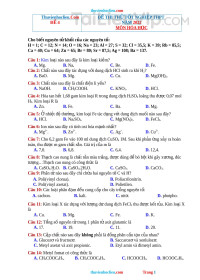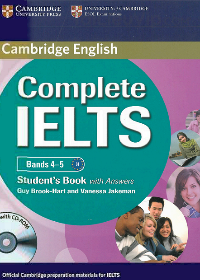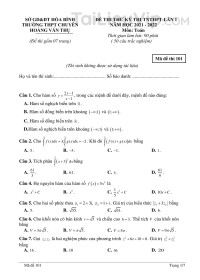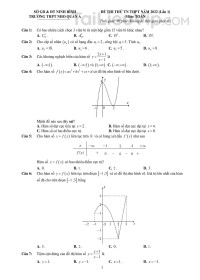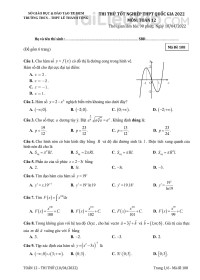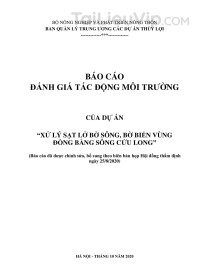Mega 2020 -Siêu tốc luyện đề thi THPT Quốc Gia 2020 - Dương Thị Hương
657 5

Tải về máy để xem đầy đủ hơn, bản xem trước là bản PDF
Tags: #luyện đề THPT Quốc Gia Tiếng Anh#bộ đề THPT tiếng anh#đề thi THPT QG
Mô tả chi tiết
Mark the letter A, B, C, or D on your answer sheet to indicate the word whose underlined part differs from the other three in pronunciation in each of the following questions.
Question 1. A. sunbatheB. fatherC. theaterD. weather
Question 2. A. weaveB. pleaseC. seafoodD. clear
Mark the letter A, B, C, or D on your answer sheet to indicate the word that differs from the other three in the position of primary stress in each of the following questions.
Question 3. A. economicsB. biologyC. experimentD. philosophy
Question 4. A. competentB. implicateC. advertiseD. reconstruct
Question 1. A. sunbatheB. fatherC. theaterD. weather
Question 2. A. weaveB. pleaseC. seafoodD. clear
Mark the letter A, B, C, or D on your answer sheet to indicate the word that differs from the other three in the position of primary stress in each of the following questions.
Question 3. A. economicsB. biologyC. experimentD. philosophy
Question 4. A. competentB. implicateC. advertiseD. reconstruct

Nội dung
ĐỀ SỐ 1 ĐỀ THI THỬ THPT QG NĂM HỌC 2020Môn: Tiếng anhThời gian làm bài: 60 phút, không kể thời gian phát đề Mark the letter A, B, C, or D on your answer sheet to indicate the word whose underlined part differs from the other three in pronunciation in each of the following questions.Question 1. A. sunbathe B. father C. theater D. weatherQuestion 2. A. weave B. please C. seafood D. clearMark the letter A, B, C, or D on your answer sheet to indicate the word that differs from the other three in the position of primary stress in each of the following questions.Question 3. A. economics B. biology C. experiment D. philosophy Question 4. A. competent B. implicate C. advertise D. reconstructMark the letter A, B, C, or D on your answer sheet to indicate the correct answer to each of the following questions.Question 5. Everyone __________ taken to hospital last night, __________ ?A. was/weren’t they B. were/ weren’t theyC. was/ wasn’t he D. were/ were theyQuestion 6. I think I put my __________ in it when I asked Lisa about her ex-husband.A. thought B. elbow C. foot D. noseQuestion 7. When Tim was a child, there __________ a park near his house.A. used to be B. used to have beenC. used to have D. used to be beingQuestion 8. If people paid more attention to the environment, the Earth __________ greener.A. would be B. will be C. would have been D. had beenQuestion 9. Many species of plants and animals are in __________ of extinction.A. dangerous B. endangered C. danger D. dangerouslyQuestion 10. Although my village is not far away from the city centre, we have had no __________ until recently.A. electric B. electricity C. electrical D. electrifyQuestion 11. Donald Trump is __________ president of __________ United States.A. the/the B. a/Ø C. the/Ø D. the/anQuestion 12. The preparation __________ by the time the guest __________ .A. have finished - arrived B. had been finished - arrivedTrang 1C. had finished - were arriving D. have been finished - were arrivedQuestion 13. We should participate in the movements __________ the natural environment.A. organizing to conserve B. organized to conserveC. organized conserving D. which organize to conserveQuestion 14. __________ at school yesterday when we were informed that there was no class due to a sudden power cut.A. We have hardly arrived B. We had arrived hardlyC. Hardly we had arrived D. Hardly had we arrivedQuestion 15. The US president Barack Obama __________ an official visit to Vietnam in May 2016, which is of great significance to the comprehensive bilateral partnership.A. delivered B. paid C. offered D. gaveQuestion 16. There is __________ in my house.A. an old square wooden table B. a square wooden old tableC. a square old wooden table D. an old wooden square tableQuestion 17. Tim wanted to know __________ in my family.A. there were how many people B. how many people were thereC. were there how many people D. how many people there wereQuestion 18. __________ should a young child be allowed to play with fireworks without adultsupervision.A. Under no circumstances B. No sooner thanC. Not only D. Only whenMark the letter A, B, C, or D on your answer sheet to indicate the word(s) CLOSEST in meaning to the underlined word(s) in each of the following questions.Question 19. Not until all their demands had been turned down did the workers decide to go on strike for more welfare.A. rejected B. sacked C. reviewed D. deletedQuestion 20. I’ll back up your ideas if they don’t believe you.A. support B. rebel C. admire D. protectMark the letter A, B, C, or D on your answer sheet to indicate the word(s) OPPOSITE in meaning to the underlined word(s) in each of the following questions.Question 21. My grandparents are always tight with their money. They hate throwing away food and never eat out.Trang 2A. to spend much money too easily B. to not like spending moneyC. to not know the value of money D. to save as much money as possibleQuestion 22. We received a lot of useful information because the report accurately reflected the current state of the company.A. carelessly B. imprecisely C. uneasily D. untruthfullyMark the letter A, B, C, or D on your answer sheet to indicate the option that best completes each of the followingexchanges.Question 23. Marry is talking to Linda over the phone.Mary: “Thank you for helping me prepare for the party.”Linda: “___________________”A. My pleasure B. The meal was out of this worldC. Never mention me D. Of course notQuestion 24. Peter is talking to Tim in their classroom.Peter: “_____________”Tim: “I won’t say no!”A. How are things with you, Tim? B. What about playing badminton this afternoon?C. Tim, do you know where the scissors are? D. What’s your favourite drink, tea or coffee?Read the following passage and mark the letter A, B, C, or D on your answer sheet to indicate the correct word or phrase that best fits each of the numbered blanks from 25 to 29.Why is it that many teenagers have the energy to play computer games until late at night but can’t find the energy to get out of bed (25) __________ for school? According to a new report, today’s generation of children are in danger of getting so (26) __________ sleep that they are putting their mental and physical health at (27) __________. Adults can easily survive on seven to eight hours’ sleep a night, (28) __________ teenagers require nine or ten hours. According to medical experts, one in five youngsters (29) __________ anything between two and five hours’ sleep a night less than their parents did at their age. (By Tim Falla and Paul A.Davies, Solutions Advanced. OUP)Question 25. A. behind time B. about time C. in time D. at timeQuestion 26. A. few B. less C. much D. littleQuestion 27. A. jeopardy B. threat C. risk D. dangerQuestion 28. A. or B. because C. whereas D. soQuestion 29. A. puts B. gets C. brings D. makesTrang 3Read the following passage and mark the letter A, B, C, or D on your answer sheet to indicate the correct answer to each of the questions from 30 to 34.Telecommuting is a form of computer communication between employees’ homes and offices. For employees whose job involve sitting at a terminal or word processor entering data or typing reports, the location of the computer is of no consequence. If the machine can communicate over telephone lines, when the work is completed, employees can dial the office computer and transmit the material to their employers. A recent survey in USA Today estimates that there are approximately 8,7 million telecommuters. But although the numbers are rising annually, the trend does not appear to be as significant as predicted when Business Week published “The Portable Executive” as its cover story a few years ago. Why hasn’t telecommuting become more popular?Clearly, change simply takes time. But in addition, there has been active resistance on the part of many managers.These executives claim that supervising the telecommuters in a large work force scattered across the country would be too difficult, or, at least, systems for managing them are not yet developed, thereby complicating the manager’s responsibilities.It is also true that employees who are given the option of telecommuting are reluctant to accept the opportunity. Most people feel that they need regular interaction with a group, and many are concerned that they will not havethe same consideration for advancement if they are not more visible in the office setting. Some people feel that even when a space in their homes is set aside as a work area, they never really get away from the office.Question 30. With which of the following topics is the passage primarily concerned?A. An overview of telecommuting. B. The failure of telecommuting.C. The advantages of telecommuting. D. A definition of telecommuting.Question 31. The author mentions all of the following as concerns of telecommuting, EXCEPT _________.A. the opportunities for advancement. B. the different system of supervision.C. the lack of interaction with a group. D. the work place is in the home.Question 32. The word “them” in the second paragraph refers to ___________.A. telecommuters B. systems C. executives D. responsibilitiesQuestion 33. The reason why telecommuting has not become popular is that the employees ___________A. need regular interaction with their families.B. are worried about the promotion if they are not seen at the office.C. feel that a work area in their home is away from the office.D. are ignorant of telecommuting.Question 34. The word “reluctant” in the third paragraph can best be replaced byA. opposite B. willing C. hesitant D. typicalRead the following passage and mark the letter A, B, C, or D on your answer sheet to indicate thecorrect answer to each of the questions from 35 to 42.Trang 4Happiness and sadness are experienced by people in all cultures around the world, but how can we tell when other people are happy or despondent? It turns out that the expression of many emotions may be universal. Smiling is apparently a universal sign of friendliness and approval. Baring the teeth in a hostile way, as noted by Charles Darwin in the nineteenth century, may be a universal sign of anger. As the originator of the theory of evolution, Darwin believed that the universal recognition of facial expressions would have survival value. For example, facial expressions could signal the approach of enemies (or friends) in the absence of language.Most investigators concur that certain facial expressions suggest the same emotions in all people. Moreover, people in diverse cultures recognize the emotions manifested by the facial expressions. In classic research Paul Ekman took photographs of people exhibiting the emotions of anger, disgust, fear, happiness, and sadness. He then asked people around the world to indicate what emotions were being depicted in them. Those queried ranged from European college students to members of the Fore, a tribe that dwells in the New Guinea highlands. All groups, including the Fore, who had almost no contact with Western culture, agreed on the portrayed emotions. The Fore also displayed familiar facial expressions when asked how they would respond if they were the characters in stories that called for basic emotional responses. Ekman and his colleagues more recently obtained similar results in a study of ten cultures in which participants were permitted to report that multiple emotions were shown by facial expressions. The participants generally agreed on which two emotions were being shown and which emotion was more intense.Psychological researchers generally recognize that facial expressions reflect emotional states. In fact, various emotional states give rise to certain patterns of electrical activity in the facial muscles and in the brain. The facial-feedback hypothesis argues, however, that the causal relationship between emotions and facial expressions can also work in the opposite direction. According to this hypothesis, signals from the facial muscles (“feedback) are sent back to emotion centers of the brain, and so a person’s facial expression can influence that person’s emotional state. Consider Darwin’s words: “The free expression by outward signs of an emotion intensifies it. On the other hand, the repression, as far as possible, of all outward signs softens our emotions.” Cansmiling give rise to feelings of good will, for example, and frowning to anger?Psychological research has given rise to some interesting findings concerning the facial-feedback hypothesis. Causing participants in experiments to smile, for example, leads them to report more positive feelingsand to rate cartoons (humorous drawings of people or situations) as being more humorous. When they are caused to frown, they rate cartoons as being more aggressive.What are the possible links between facial expressions and emotion? One link is arousal, which is the levelof activity or preparedness for activity in an organism. Intense contraction of facial muscles, such as those used in signifying fear, heightens arousal. Self-perception of heightened arousal then leads to heightened emotional activity. Other links may involve changes in brain temperature and the release of neurotransmitters (substances that transmit nerve impulses.) The contraction of facial muscles both influences the internal emotional state and reflects it. Ekman has found that the so-called Duchenne smile, which is characterized by “crow’s feet” wrinkles around the eyes and a subtle drop in the eye cover fold so that the skin above the eye moves down slightly toward the eyeball, can lead to pleasant feelings. Ekman’s observation may be relevant to the British expression “keep a stiff upper lip” as a recommendation for handling stress. It might be that a “stiff” lip suppresses emotionalresponse - as long as the lip is not quivering with fear or tension. But when the emotion that leads to stiffening the lip is more intense, and involves strong muscle tension, facial feedback may heighten emotional response.Question 35. The word “despondent” in the passage is closest in meaning to ___________A. Curious B. Unhappy C. Thoughtful D. UncertainQuestion 36. The author mentions “Baring the teeth in a hostile way” in order to ___________A. Differentiate one possible meaning of a particular facial expression from other meanings of itsTrang 5B. Support Darwin’s theory of evolutionC. Provide an example of a facial expression whose meaning is widely understoodD. Contrast a facial expression that is easily understood with other facial expressionsQuestion 37. The word “them” in the passage refers to ___________A. Emotions B. People C. Photographs D. CulturesQuestion 38. According to paragraph 2, which of the following was TRUE about the Fore people of New Guinea?A. They did not want to be shown photographs.B. They were famous for their story-telling skills.C. They knew very little about Western culture.D. They did not encourage the expression of emotions.Question 39. According to the passage, what did Darwin believe would happen to human emotions that were not expressed?A. They would become less intense. B. They would last longer than usual.C. They would cause problems later. D. They would become more negativeQuestion 40. According to the passage, research involving which of the following supported the facial-feedback hypothesis?A. The reactions of people in experiments to cartoonsB. The tendency of people in experiments to cooperateC. The release of neurotransmitters by people during experimentsD. The long-term effects of repressing emotionsQuestion 41. The word “rate” in the passage is closest in meaning to ___________.A. Judge B. Reject C. Draw D. WantQuestion 42. According to the passage, stiffening the upper lip may have which of the following effects?A. It first suppresses stress, then intensifies it.B. It may cause fear and tension in those who see it.C. It can damage the lip muscles.D. It may either heighten or reduce emotional response.Mark the letter A, B, C, or D on your answer sheet to indicate the underlined part that needs correction in each of the following questions.Question 43. The man warned the children don’t lean their bicycles against his windows.A. The B. don’t C. their D. againstQuestion 44. The number of nature reserves have increased dramatically so as to protect endangered species.Trang 6A. have B. dramatically C. protect D. speciesQuestion 45. If you are working with young children in a primary school, you will find that teaching lively songs and rhymes are very popular.A. with B. primary C. will find D. areMark the letter A, B, C, or D on your answer sheet to indicate the sentence that is closest in meaning to each of the following questions.Question 46. Mary is so creative that we all can rely on her for original ideas.A. Being creative, we can all rely on Mary for original ideas.B. Creative as Mary is, we can rely on her for original ideas.C. Mary is such creative girl that we all can rely on her for original ideas.D. So creative is Mary that we all can rely on her for original ideas.Question 47. Lisa always reminds me of my youngest sister.A. My youngest sister’s name is Lisa.B. I always think of Lisa, my youngest sister.C. Whenever I see Lisa, I think of my youngest sister.D. It is Lisa who is my youngest sister.Question 48. Sometimes what is best for society is not always good for an individual living in that society.A. From time to time, there is a conflict between the benefits of a society and an individual living in that society.B. Individuals not always seek for the best of the society they live in.C. It is impossible for individuals to accept the rules of the society they live in. D. What is best for individuals is always suitable for the society they live in.Mark the letter A, B, C, or D on your answer sheet to indicate the sentence that best combines each pair of sentences in the following questions.Question 49. He raised his hand high. He wanted to attract his teacher’s attention.A. Because his teacher attracted him, he raised his hand high.B. To attract his teacher’s attention, he raised his hand high.C. Though he raised his hand high, he could not attract his teacher’s attention.D. He had such a high raising of hand that he failed to attract his teacher’s attention.Question 50. We can protect the world in which we live. We, for example, can grow more trees and recycle rubbish.Trang 7A. We can protect the world in which we live as well as we can grow more trees and recycle rubbish.B. We can protect the world in which we live, growing more trees and recycle rubbish.C. We can protect the world in which we live by growing more trees and recycling rubbish.D. We can protect the world in which we live such as growing more trees and recycling rubbish.Đáp án1-C 2-D 3-A 4-D 5-A 6-C 7-A 8-A 9-C 10-B11-A 12-B 13-B 14-D 15-B 16-A 17-D 18-A 19-A 20-A21-A 22-B 23-A 24-B 25-C 26-D 27-C 28-C 29-B 30-A31-B 32-A 33-B 34-C 35-B 36-C 37-C 38-C 39-A 40-A41-A 42-D 43-B 44-A 45-D 46-D 47-C 48-A 49-B 50-CLỜI GIẢI CHI TIẾTQuestion 1: Đáp án C- Sunbathe /ˈsʌn.beɪð /: (v) tắm nắng - father / ˈfɑː.ðə/ (n): bố cha- theater / θiə.tər/ (n): rạp hát - weather /ˈweð.ər/ (n): thời tiếtQuestion 2: Đáp án D- weave / wiːv/ (v): đan, dệt - please / pliːz / (v): làm hài lòng- seafood /ˈsiːfuːd/ (n): hải sản - clear / klɪər/ (adj): trong sạch, sáng sủaQuestion 3: Đáp án A- economics /ˌiːkəˈnɒmɪks/ (n): kinh tế học - biology /baɪˈɒlədʒi/ (n): sinh vật học- experiment /ɪkˈsperɪmənt/ (n): thí nghiệm - philosophy /fɪˈlɒsəfi/ (n): triết họcQuestion 4: Đáp án D- competent /ˈkɒmpɪtənt/ (adj): có năng lực, giỏi- implicate /ˈɪmplɪkeɪt/ (v): làm dính líu vào, làm vướng vào- advertise /ˈædvətaɪz/ (v): quảng cáoTrang 8- reconstruct /ˌriːkənˈstrʌkt/ (v): xây dựng lạiQuestion 5: Đáp án A- Trạng từ thời gian trong câu là “last night” nên ta chia động từ ở thì quá khứ đơn.- Chủ ngữ là “everyone” nên động từ được chia ở dạng số ít => loại B, D- Chủ ngữ là “everyone - mọi người” nên phần hỏi đuôi ta dùng đại từ “they”Dịch: Tối qua mọi người đã được đưa tới bệnh viện phải không?Note 1: Câu hỏi đuôi (Tag questions)Các trường hợp đặc biệt:a. Câu bắt đầu bằng “I am” thì phần hỏi đuôi là “aren’t I”b. Câu bắt đầu bằng “Let’s” thì phần hỏi đuôi là “shall we”c. Câu mệnh lệnh khẳng định phần hỏi đuôi là “will/could/would/won’t you”; câu mệnh lệnh phủ định thì phần hỏi đuôi là “will you”d. Khi chủ ngữ là this/that, thì phần hỏi đuôi ta dùng đại từ “it”e. Khi chủ ngữ là these, those thì phần hỏi đuôi ta dùng “they”f. Khi chủ ngữ là there, phần hỏi đuôi ta vẫn dùng “there”g. Khi chủ ngữ là những đại từ bất định như: anyone, anybody, no one, nobody, everybody, everyone, sombody, someone thì chúng ta dùng đại từ “they” làm chủ ngữ trong câu hỏi đuôi.h. Khi chủ ngữ là những đại từ bất định như everything, something, anything, nothing thì chúng ta dùng đại từ “it” làm chủ từ trong câu hỏi đuôi.i. Khi mệnh đề chính có cấu trúc: “I + think/believe/suppose/….” + mệnh đề phụ thì ta dùng động từ trong mệnh đề phụ để xác định động từ cho câu hỏi đuôi.Cũng mẫu cấu trúc này nhưng nếu chủ từ không phải là “I” thì dùng động từ chính trong câu (think/believe/suppose/…) để xác định động từ cho câu hỏi đuôi.j. Khi câu đầu sử dụng động từ “had better”, ta mượn trợ động từ “had” để lập câu hỏi đuôi; Khi câu đầu sử dụng động từ “would rather”, ta mượn trợ động từ “would” để lập câu hỏi đuôi.Question 6: Đáp án C- ex-husband (n): chồng cũ, chồng trước- thought (n): suy nghĩ- elbow (n): khuỷu tay- foot (n): bàn chân- nose (n): mũi xúc phạmDịch: Tôi nghĩ tôi đã thiếu tế nhị khi hỏi Lisa về chồng cũ của cô ấy.Question 7: Đáp án ATrang 9Cấu trúc:- There + is/ are + N ...: dùng để chỉ sự tồn tại của người/vật mà không có đối tượng sở hữu- Used to + V (bare-inf): đã từng ...Dịch: Khi Tim còn bé thì đã từng có một công viên gần nhà cậu ấy.Question 8: Đáp án AMệnh đề if: If people paid a little more attention to the environment → câu điều kiện loại 2Dịch: Nếu con người quan tâm đến môi trường hơn thì Trái Đất sẽ xanh đẹp hơn.Note 2:a. Conditional sentences type 1 (Câu điều kiện loại 1)Use: Chỉ sự việc, hành động có khả năng xảy ra ở hiện tại hoặc trong tương lai.Form:If clause Main clauseIf + S + V (present tense)…. S + will + V (bare – inf)E.g.: If I get the scholarship, I will study in New Zealand. (Nếu tôi nhận được học bổng thì tôi sẽ học ở New Zealand.)* Lưu ý:- Chúng ta có thể dùng “may, might, can, could, should, ought to, have to” thay thế cho “will” phụ thuộc vào nghĩa của câuE.g.: If you stay there long enough, you might see him.- Đảo ngữ: If + S + V (present tense),... = Should + S + V bare-inf, ...E.g.: If he calls me, I’ll answer immediately => Should he call me, I’ll answer immediately. (Nếu anh ấy có gọi tôi thì tôi sẽ trả lời ngay lập tức.)b. Conditional type 2 (Câu điều kiện loại 2)Use: Chỉ sự việc, hành động không thể xảy ra ở hiện tại hoặc tương lai, điều kiện chỉ là một giả thiết, một ước muốn trái ngược với thực tế ở hiện tại. (Câu điều kiện không có thực ở hiện tại). Để đưa ra lời khuyên.Form:If clause Main clauseIf + S + V (past tense)/ could + V (bare-inf)…. S + would + V (bare – inf)…E.g.:If I had money, I could buy a new car. (Nếu tôi có tiền thì tôi có thể mua được ô tô mới.) (= I don’t have money, so I couldn’t buy a new car.)If I were you, I would buy that house. (Nếu tôi là bạn thì tôi sẽ mua ngôi nhà đó.)→ đưa ra lời khuyênTrang 10
- Xem thêm -


